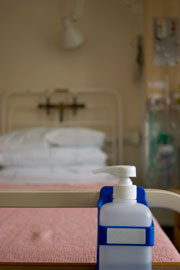Scientists from Ireland, the Czech Republic and Spain have found an antimicrobial ionic liquid that targets MRSA (methicillin-resistant Staphylococcus aureus). MRSA has made headlines in recent years as a superbug that is resistant to most standard antibiotics. The superbug is common in hospitals where patients have open wounds and weakened immune systems and at its peak, it was said to have caused 1652 deaths in the UK in 2006.
Research into finding potential antibiotic drugs against MRSA is ongoing, with many drugs currently being tested in clinical trials. Nicholas Gathergood, from Dublin City University, and colleagues, have prepared imidazolium-based ionic liquids from amino acid esters and dipeptidyl side chains as the building blocks. They tested the ionic liquids’ toxicity and found that the majority were non-toxic to microbes but two of them were highly toxic to Gram-positive bacteria, including MRSA. The two toxic compounds possessed a phenylalanine motif adjacent to the cation core. However, an analogue with a phenylalanine-phenylalanine sequence, an ionic liquid with increased lipophilicity, was less active (with no MRSA selectivity). A general trend in antimicrobial toxicity of ionic liquids is increased toxicity with increased lipophilicity. The compounds also passed ecotoxicity tests that show that they can be classed as biodegradable.

The hospital superbug MRSA is resistant to most standard antibiotics. Ionic liquids combine green chemistry and medicinal chemistry in a new way to fight it
Read the full story in Chemistry World
Link to journal article
Antimicrobial toxicity studies of ionic liquids leading to a ‘hit’ MRSA selective antibacterial imidazolium salt
Deborah Coleman , Marcel Špulák , M. Teresa Garcia and Nicholas Gathergood
Green Chem., 2012, Advance Article, DOI: 10.1039/C2GC16090K










